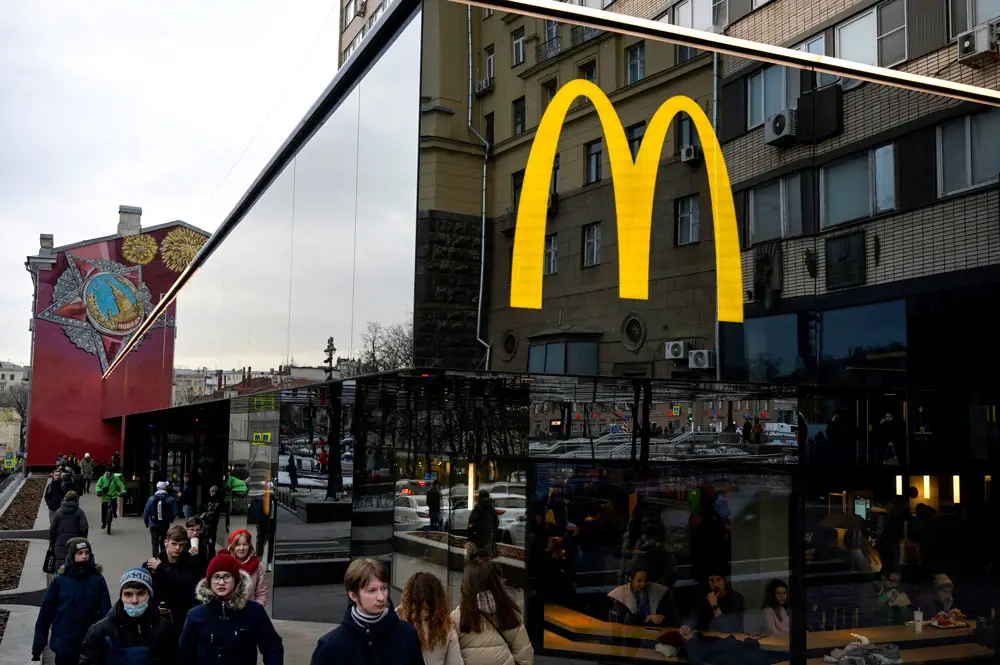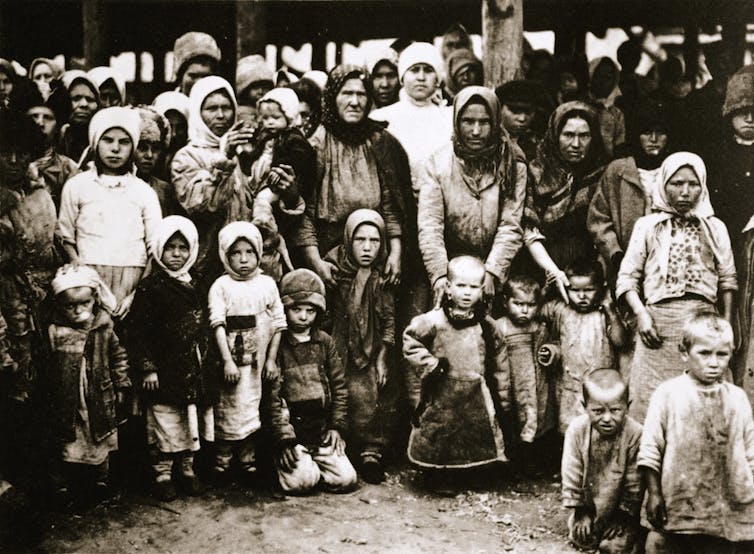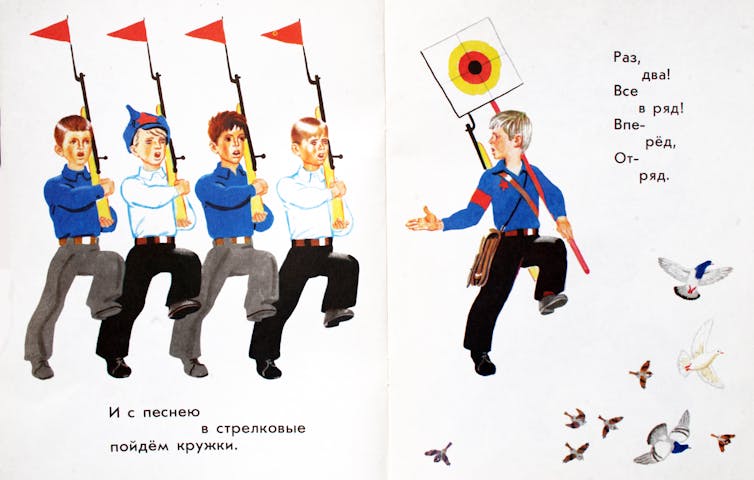
(AFP via Getty Images)
By Julia Khrebtan-Hörhager and Evgeniya Pyatovskaya
While Russia is leading a merciless war in Ukraine that has resulted in millions of Ukrainian refugees’ fleeing to neighboring countries, Western brands are on the exodus from Russia.
The closure of over 800 McDonald’s restaurants particularly stands out: McDonald’s was the first American restaurant to open in Russia, in 1990. Its arrival symbolized Russia’s new pro-Western era.
That era is rapidly ending, giving way to a quickly spreading revival of Russian nationalism. Such nationalism is a direct outcome of the country’s economic suffocation through sanctions and the West’s broad rejection of Russia and its war with Ukraine.
The West is punishing Russia, hoping that the dire economic crisis provoked by sanctions will put an end to the bloody war against Ukraine, an independent state that was once an integral part of the Soviet Union.
We are international critical cultural scholars with extensive experience in various geopolitical contexts – the U.S., European Union and post-Soviet countries. We believe that those who think that sanctions will turn Russia and Russians around and end the war know very little about the country, its history and its people.

Historica Graphica Collection/Heritage Images/Getty Images
Russians’ perpetual suffering
Russians are used to turmoil and instability. They endured cruel social experiments during the 20th century, and the early 21st, performed upon them by their own political leadership. Except for the rare example of Mikhail Gorbachev, Russian leadership during that period was never democratic.
The country, whose participation in World War I was led by a weak czar, emerged impoverished from that conflict. The czar’s rule was brutally overturned by a Bolshevik uprising that ushered in Soviet rule for decades. The crafting of the Soviet state entailed exiling millions of its own people to the gulag camps and cold-blooded execution of many of them during Stalin’s mass repressions from 1917 to 1956.
Private property was abolished in 1929, and political leaders commanded absolute, selfless obedience to the Soviet state. World War II required painful sacrifice from every citizen, including children.
After the war was over, the depleted USSR constructed the metaphorical Iron Curtain, preventing its citizens from traveling to and communicating with the West. The Soviet state’s attempts to expand its Communist influence led to the Cold War. During that period, failed agricultural reforms gave rise to food rationing. The painful disintegration of the USSR in 1990 brought economic turmoil to the newly formed Russia, along with unemployment and high suicide rates.
What does this catalog of woes teach us? To us, it suggests the Russians cannot be scared by a sanctions-induced absence of goods. , iPhones, fancy coffee and foreign cars became a part of Russian life over the past 20 years – but the Russians have had them for far too short a time to be unable to imagine life without them. In any case, most of the luxury businesses – McDonald’s is considered a luxury business in Russia – operated in Moscow and its neighboring regions, whereas the overwhelming majority of the Russians did not get to see them in their towns.
United in their struggle
Historically, any political and economic struggle united Russia and its people, especially in the face of a common enemy. The enemy was traditionally represented by the West.
World War II and the Cold War united the nation around the idea of self-sacrifice as central to the Soviet identity. The identity – a kind of Soviet exceptionalism – consisted of a morally superior nation that values the ephemeral Soul – the mysterious Russian “душа” – more than the perishable Western flesh.
Soviet identity encompassed a great variety of ethnicities, including but not limited to only Russia. Although the capital of the USSR was Moscow, and the official language of the Soviet Union was Russian, the USSR consisted of 14 additional republics, and united more than 100 nationalities. The claimed unity of the nations is debatable, as the sameness was often imposed by forced assimilation – Russification, or spread of the Russian language and culture – and Sovietization, or the state monopoly on everything, combined with groupthink. So “Soviet” refers to anyone who lived in the USSR, including Ukrainians, Russians, Georgians, Belorussians, Armenians, Azerbaijanis and Estonians.

Universal History Archive/Getty Images
The USSR used pompous discourse that glorified Soviet sameness and the moral sacrifice of its people as a trigger for patriotism and loyalty to the motherland, whose core was Russia. Among popular slogans and sayings were: “Раньше думай о Родине а потом о себе”/“First, think about your motherland, and only then, think about yourself”; “Я – последняя буква алфавита”/“‘I’ is the last letter of the alphabet,” which it is in Cyrillic; and “Я русский бы выучил только за то, что им разговаривал Ленин!”/“I would learn Russian alone because Lenin spoke it!”
Eventually, “Russia” and “the USSR” were understood and used interchangeably, at home and abroad. Therefore, for many Russians, especially those born and raised in the USSR, watching Ukraine embrace the West means letting part of Russia’s history go with it.
[Get The Conversation’s most important politics headlines, in our Politics Weekly newsletter.]
The wounded bear
We believe the West’s sanction strategy could backfire.
Not all Russians support the war in Ukraine and the government that dragged them into it. But all Russians are suffering from the sanctions and the crisis. Their common suffering is a dangerous thing: It is all too familiar; it makes them angry, and some are eager to strike back.
The possibility of this stems from the Russian national mindset, crafted in Soviet times and now affecting even generations that grew up in post-Soviet Russia. Western freedoms are only partially appealing, since historically, Russians never had them – not freedom of speech, self-determination, religion nor unrestricted travel.
Instead, the Russian people are patient, stoic and often irrationally devoted to their cruel motherland, whose autocratic leader started a war.
Where does that leave the Russians? From our perspective, in a deep limbo: The country-aggressor that is currently bombing and destroying Ukraine is also their beloved homeland, and by now the only place in the world that accepts them as they are.
Having their country be an international pariah is not new for Russians, from its climate policies to its sports and its foreign affairs, including its widely condemned annexation of Crimea.
But today’s situation is extreme. We believe the chances that Russians will turn toward their government – as they feel rejected by the global community – are high.
That will likely lead to the intensifying of Putin’s autocratic regime under the guise of restoring the country’s industry and economy in the face of Western rejection.
Russia will have a common enemy again, and because thinking – and acting – disobediently in Russia typically has drastic consequences, dissent will not be heard. Putin opponents, among them Anna Politkovskaya, Alexander Litvinenko, Boris Nemtsov, Alexei Navalny and many others – some murdered, some imprisoned – serve as cautionary tales of punishment for political dissent in Russia.
Encouraging Russians to protest their autocratic government, as the West has done, while cutting ties with them, thus becomes an ideological oxymoron. It is punishing the people for what that government does while suffocating them economically.
In Siberia, safety rules are a matter of life and death. One of them is about always leaving the bear a route to escape. The bear is particularly aggressive when wounded, cornered and protective of its cubs. The wounded bear, representing the Russian nation, is not an exception.
![]()
Julia Khrebtan-Hörhager is Associate Professor of Critical Cultural & International Studies at Colorado State University. Evgeniya Pyatovskaya is a Ph.D. Candidate in Communication at the University of South Florida.





























Frederick says
Very good article but only provided reasons why what is being done may not work but no alternatives with what will. Would the authors just have us sit by and do nothing? Would the authors just want the world to continue on being nice to the Russian government like nothing is going on.? If you are going to say why it won’t work, provide some alternatives.
Sherry says
Putin’s horrific sycophants not only include trump, but FOX’s highly dangerous idiot tucker carlson and unhinged Congressional representative from NC madison cawlfield who are celebrated on Russian (government controlled) television:
https://www.businessinsider.com/russian-state-tv-features-tucker-carlson-and-rep-madison-cawthorn-2022-3
People like these are the true traitors to our nation!
Bill C says
And don’t leave out Donald Trump who called Putin a “genius” and “savvy” just before the invasion.
C. J. says
“The West is punishing Russia, hoping that the dire economic crisis provoked by sanctions will put an end to the bloody war against Ukraine, an independent state that was once an integral part of the Soviet Union.”
We, the West, should be sanctioning Russia whether we succeed or not in helping to bring an end of their WAR against a sovereign nation. Our commercial companies should NOT be profiting from doing business with despots, in Russia or despots anywhere else. These US companies do not pay their share of taxes here in support or their own country, and we should allow them to further enrich themselves in Russia? Do we believe they are NOT paying Putin and oligarchs for the privilege of selling/producing product in Russia?
Ukraine was “an independent state that was once an integral part of the Soviet Union,” really? Ask my Grandmother and Grandfather who emigrated here in the early 1900’s, just how sovereign/independent their state was! Both would be armed and fighting Russians now if they were still alive. The Ukraine then was the “bread basket” to Russia and its people were serfs. Is this what you wish upon their people now? I say we cannot sanction them too much…but it is Putin, the oligarchs including their talking heads who get their kickbacks who have to suffer, not the common man.